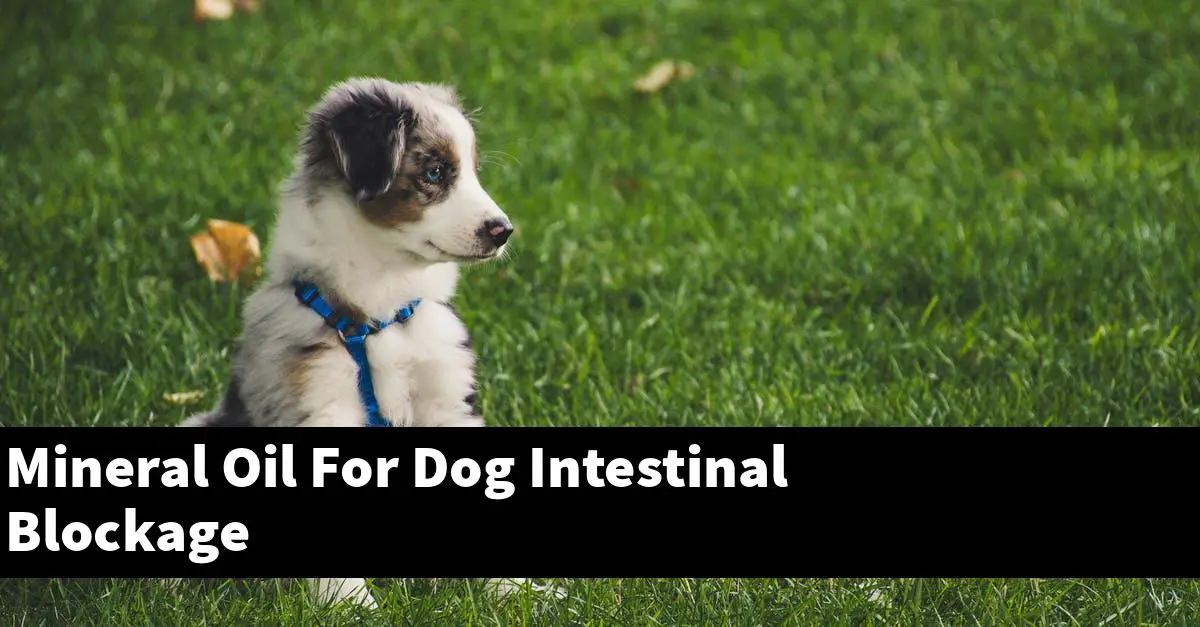Mineral oil is sometimes used as a laxative for humans and is safe for occasional use in dogs, but can cause intestinal blockage if used too often.
The article is going to be covering how to use mineral oil for dog intestinal blockage.
Table of Contents
What are the benefits of using mineral oil for dog intestinal blockage?
Mineral oil has been used for centuries as a remedy for a wide variety of ailments, including intestinal blockage in dogs. Its lubricating and stool-softening properties make it an effective treatment for constipation and other forms of gastrointestinal distress.
When used correctly, mineral oil is safe for dogs and can provide relief from uncomfortable symptoms quickly. However, it is important to use the correct dosage and to follow the instructions of your veterinarian closely. Overdosing or using mineral oil incorrectly can lead to serious health problems, so it is always best to err on the side of caution.
If your dog is suffering from constipation or another form of gastrointestinal distress, talk to your veterinarian about whether mineral oil would be a safe and effective treatment option.
How does mineral oil help to relieve dog intestinal blockage?
Minerals oils can help to relieve dog intestinal blockages by lubricating the intestines and helping to break down any blockages. The oil can also help to reduce inflammation in the intestines and help to improve overall gut health.
What are the side effects of using mineral oil for dog intestinal blockage?
There are a few side effects to using mineral oil for dog intestinal blockage. The most common is diarrhea. This is because the oil can act as a laxative. It is also important to make sure that the dog drinks plenty of water when taking mineral oil, as it can cause dehydration. In rare cases, mineral oil can also cause an upset stomach or vomiting. If these side effects occur, it is important to stop giving the mineral oil and contact a veterinarian.
How often should mineral oil be used for dog intestinal blockage?
There is no definitive answer to this question as it will depend on the individual dog and the severity of the intestinal blockage. However, it is generally recommended that mineral oil be used every day for at least a week, and then as needed thereafter. If the blockage is severe, your veterinarian may recommend a longer course of treatment.
Will mineral oil help my dog pass an obstruction?
No, mineral oil is not an effective way to treat or prevent gastrointestinal obstructions in dogs. In fact, it can actually make the problem worse.
Gastrointestinal obstructions occur when something blocks the normal passage of food and liquids through the digestive tract. This can be caused by a foreign object, such as a piece of bone or toy, or by a buildup of food or other material in the intestines.
Symptoms of an obstruction include vomiting, diarrhea, loss of appetite, and abdominal pain. If left untreated, an obstruction can lead to serious complications, such as dehydration, malnutrition, and even death.
Treatment for an obstruction typically involves surgery to remove the blockage. In some cases, however, conservative treatment with fluids and rest may be enough to allow the obstruction to pass on its own.
Mineral oil is sometimes used as a home remedy for constipation, but it is not effective for treating gastrointestinal obstructions. In fact, it can actually make the problem worse.
Mineral oil works by lubricating the intestine, which can help to ease the passage of stool. However, it can also lubricate the blockage, making it more likely to move further down the digestive tract and become stuck. This can lead to a more serious obstruction.
If your dog is vomiting, has diarrhea, or is showing any other signs of an obstruction, it is important to seek veterinary care immediately. Do not give your dog mineral oil or any other home remedy without first speaking to your vet.
How can I help my dog with an intestinal blockage?
If your dog has an intestinal blockage, there are a few things you can do to help. First, it is important to make sure that your dog is getting plenty of fluids. This will help to prevent dehydration and will also help to flush the blockage out of the system. You can give your dog plain water or an electrolyte solution, such as Pedialyte.
Next, you will want to feed your dog a bland diet. This will help to avoid further irritation to the digestive system. Good options for a bland diet include boiled chicken and rice, cottage cheese, or mashed potatoes. Avoid feeding your dog fatty or spicy foods, as these can make the blockage worse.
If your dog is still having trouble passing the blockage, you may need to give him a laxative. This will help to soften the blockage and make it easier to pass. Be sure to talk to your vet before giving your dog any laxatives, as they can have side effects.
Finally, if your dog is still having trouble, you may need to take him to the vet for surgery. This is usually a last resort, but it may be necessary to remove the blockage.
If your dog has an intestinal blockage, there are a few things you can do to help. First, it is important to make sure that your dog is getting plenty of fluids. This will help to prevent dehydration and will also help to flush the blockage out of the system. You can give your dog plain water or an electrolyte solution, such as Pedialyte.
Next, you will want to feed your dog a bland diet. This will help to avoid further irritation to the digestive system. Good options for a bland diet include boiled chicken and rice, cottage cheese, or mashed potatoes. Avoid feeding your dog fatty or spicy foods, as these can make the blockage worse.
If your dog is still having trouble passing the blockage, you may need to give him a laxative. This will help to soften the blockage and make it easier to pass. Be sure to talk to your vet before giving your dog any laxatives, as they can have side effects.
Finally, if your dog is still having trouble, you may need to take him to the vet for surgery. This is usually a last resort, but it may be necessary to remove the blockage.
Is mineral oil harmful to dogs?
Mineral oil is a petroleum-based product that is often used as a laxative or to treat constipation. It is also used as a lubricant and in some cosmetics. Although it is not harmful if used as directed, mineral oil can be toxic if ingested in large quantities or if it comes into contact with the skin for a prolonged period of time. If your dog ingests mineral oil, he may experience vomiting, diarrhea, and abdominal pain. If you think your dog has ingested mineral oil, contact your veterinarian or the ASPCA Animal Poison Control Center at (888) 426-4435.
Can I give my dog mineral oil to poop?
Yes, you can give your dog mineral oil to poop, but it is not the best option. Mineral oil lubricates the stool and makes it easier to pass, but it can also lead to dehydration and electrolyte imbalance. It is best to talk to your veterinarian about the best option for your dog.
Summary
: Mineral oil is safe for occasional use in dogs, but can cause intestinal blockage if used too often. Be sure to follow the instructions of your veterinarian closely.


